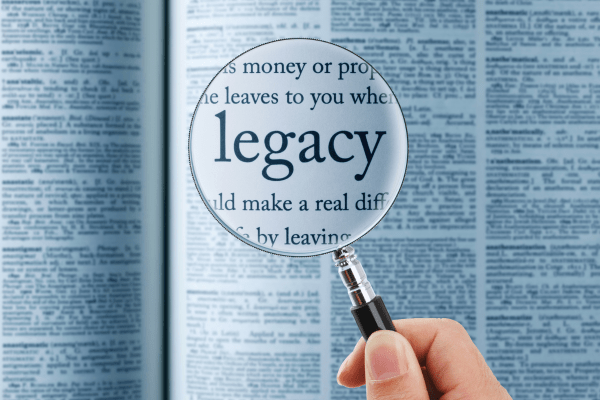You can sign up to our LinkedIn newsletter here.
Seeking Significance: Part One – Success vs Significance
As I write this in late 2024, Joe Biden is coming to the end of his term, and people are discussing his legacy. Legacy is often a question we ask ourselves as we seek significance. But is legacy all it’s cracked up to be? For Joe Biden his legacy may be considered what’s left over after the end of his presidential term or what’s left over after he’s passed away.
Many of us think of legacy as something that will remain after the end of our lives. How intentional do we want to be in establishing a legacy? Let’s break it down.
Financial Legacy
How much do we want to leave behind? Money for our children, grandchildren, spouse, or favourite charitable cause? Is our former university part of our financial legacy? Many of us are concerned about the money we can leave to others. For others, we think, “Actually, that’s up to them,” we must make the most use of the resources we have during our lifetime and seek to give away everything we can before we die.
Relational Legacy
As I get older, I inevitably attend more funerals. What’s very interesting at funerals is what people say about those who have died. Unless you were sufficiently well-known to have an obituary in a newspaper or online, or perhaps on the radio, most of you won’t have a written record of your lifetime’s achievements. At funerals, what I notice is that most of what people talk about is the legacy left in terms of children, family, and the memories of the relationships built. They may talk about their character — kind, awkward, or whatever else — or the times they cared for, loved, or upset others.
A lot of what I hear in eulogies is about what it was like to have that person in your life. Relational legacy can be significant. Too often, we lose sight of its importance. Maybe it’s something we should think about before we die. It’s become increasingly fashionable, especially at milestone birthdays, for friends and family to create video testimonials celebrating what it was like to be in a relationship with that person.
Trial Run and Reconciliation
This happened on my 60th birthday when a series of friends and connections made a video to celebrate what it was like to be in a relationship with me. Perhaps that’s something you should think about for your own life. If someone does that for you, not only notice what they say but also what they don’t. Are there things they don’t mention that you wish they had? Maybe it’s important about who you are or how you want to be seen, but others haven’t noticed.
Think about what you want to do to change your relational legacy. Are there people you’ve fallen out with that you want to reconcile with so that when your life ends, there are no loose ends left in your relationships?
Impact Legacy
The third kind of legacy is what I might call an “impact legacy” — where you’ve made a difference. Perhaps the only difference you’ve made is raising a family. It’s not just an “only”: it’s significant. It can be done well, or it can be poorly done. Maybe you’ve had an essential role in one of the causes you’re involved with. Or perhaps you can think of individuals you’ve helped along their journey who are thriving.
You might think of a business you started, a change of direction you achieved, or perhaps a community group you built. These are all forms of impact legacy. What can you reflect on and say, “This is where I made a difference”? Did you make a difference beyond your own immediate needs?
If you’re looking back today and wondering, “What difference have I made?” perhaps that’s something you want to spend some of the time you have left creating — an impact legacy.
Does Legacy Matter?
So, is legacy all it’s cracked up to be? Does what’s left over matter to you once you’re gone? Maybe it doesn’t. Perhaps everything between now and the end of your days is about living in the moment. But there seems to be something profound in the human psyche that asks, “Could I have life after death?” And is that life after death the legacy I leave through my relationships, the money I can distribute, and the impact I’ve made on others?
Seeking Significance: Part Three – Significant to Whom?

Charles McLachlan is the founder of FuturePerfect and on a mission to transform the future of work and business. The Portfolio Executive programme is a new initiative to help executives build a sustainable and impactful second-half-career. Creating an alternative future takes imagination, design, organisation and many other thinking skills. Charles is happy to lend them to you.
